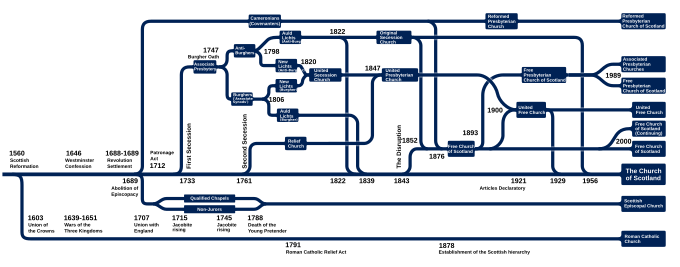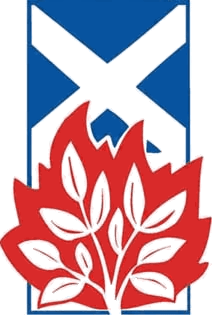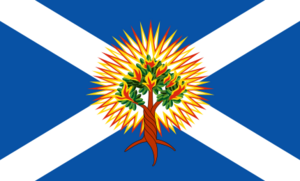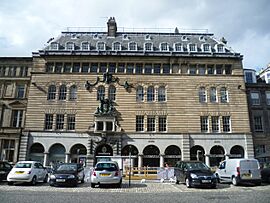Church of Scotland facts for kids
Quick facts for kids Church of Scotland |
|
|---|---|

|
|
| Abbreviation | CoS |
| Type | Communion |
| Classification | Protestant |
| Orientation | Reformed |
| Theology | Calvinism |
| Polity | Presbyterian |
| Governance | General Assembly of the Church of Scotland |
| Moderator | Rt Rev Sally Foster-Fulton |
| Associations |
|
| Region | Scotland |
| Territory | Scotland |
| Founder | John Knox |
| Origin | August 1560 (Reformation Parliament) 465 years ago |
| Independence | 28 July 1921 |
| Separated from | Roman Catholic Church |
| Absorbed |
|
| Separations |
|
| Congregations | 1,136 (2023) |
| Members |
|
The Church of Scotland (also called The Kirk) is a Christian church in Scotland. It is a Presbyterian church, meaning it is led by groups of elders and ministers, not by bishops. It is the national church of Scotland and one of the country's largest. In 2023, it had about 259,200 members.
The Church of Scotland was greatly influenced by John Knox during the Scottish Reformation in 1560. This was a time when it separated from the Catholic Church. It became a "Reformed" church, which means it follows ideas from John Calvin. The church believes that God invites everyone to worship Jesus. It does not have one single leader, as it believes God is the true head of the church.
The Church of Scotland celebrates two main ceremonies called sacraments: Baptism and the Lord's Supper (also known as Holy Communion). It also has other important practices like Confirmation and Matrimony (marriage). The church follows the Bible and the Westminster Confession of Faith. It is part of the World Communion of Reformed Churches, which connects similar churches worldwide. Each year, the church holds a big meeting called the General Assembly, led by a person called the Moderator.
Contents
History of the Church of Scotland
Early Christian Roots in Scotland
The first Christians in Scotland are believed to have been converted by Saint Ninian around 400 AD. Later, Saint Columba founded a famous mission on the island of Iona about 200 years later. In 1192, a special order from the Pope made the Scottish church independent from other church leaders, answering only to the Pope.
How the Church of Scotland Began
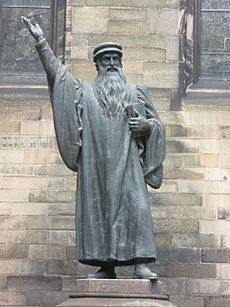
The Church of Scotland as we know it today started during the Scottish Reformation in 1560. At this time, many people in Scotland broke away from the Catholic Church. This Protestant reform was led by people like John Knox. He had learned about the ideas of John Calvin while living in Geneva, Switzerland.
In 1560, a group of Scottish nobles and churchmen formed a Parliament. They ended the Pope's authority in Scotland and approved a new statement of faith called the Scots Confession. However, the Queen, Mary I, who was Catholic, did not agree with these changes. This meant the new church's rules were not fully set.
Over time, leaders like Andrew Melville pushed for the church to be governed by elders, not bishops. This system is called presbyterianism. In 1592, Parliament officially approved Presbyterian courts. However, when James VI became King of England in 1603, he wanted bishops back in the church. He believed that "No bishop, no king," meaning he thought bishops helped support the monarchy. By 1625, the Church of Scotland had bishops again.
Changes and Challenges
King Charles I tried to make the Scottish church more like the Church of England. He introduced a new Scottish Prayer Book in 1637. This caused riots, starting with Jenny Geddes in Edinburgh. Many Scots signed the National Covenant in 1638, protesting these changes.
In November 1638, the General Assembly declared the Prayer Book illegal and got rid of bishops. The Church of Scotland became Presbyterian again. This led to wars called the Bishops' Wars. During these conflicts, the Scots agreed to the Westminster Confession of Faith, which is still an important document for the Church of Scotland today.
After the King was restored to power, bishops were brought back to Scotland. This caused a lot of unhappiness, especially in the southwest where Presbyterian ideas were strong. In 1690, after the Glorious Revolution, Presbyterian rule was made law in Scotland. This led to the formation of the Scottish Episcopal Church for those who still supported bishops.
Becoming Fully Independent
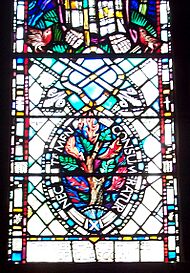
There were still disagreements about how much the government could interfere with church decisions. In 1711, a law allowed landowners to choose ministers for churches, which caused more problems. This led to several groups leaving the church, most notably in the Disruption of 1843. A large part of the church broke away to form the Free Church of Scotland. Over time, many of these separate groups reunited.
In 1921, the UK Parliament passed a law, the Church of Scotland Act 1921, which finally gave the Church of Scotland full independence in spiritual matters. This meant the government could not tell the church what to believe or how to worship. Because of this, the church was able to unite with the United Free Church of Scotland in 1929.
Some smaller Presbyterian churches in Scotland still remain separate today. The motto of the Church of Scotland is nec tamen consumebatur, which is Latin for "Yet it was not consumed." This refers to the Burning Bush in the Bible (Exodus 3:2), which burned but was not destroyed.
Recent Developments
In 2023, the Church of Scotland looked into its past connections to the Atlantic slave trade. A report found that some church ministers and buildings benefited from wealth made through slavery. It also noted that enslaved people helped build churches in the West Indies. The church recommended making a statement of apology and creating a special page on its website about these connections.
Beliefs and Practices
The Church of Scotland believes the Bible is the "Word of God." Its main guide for faith is The Westminster Confession of Faith (from 1647). However, members are allowed to have different opinions on smaller matters that don't change the main beliefs.
The church does not have a required prayer book. It does have a hymn book for singing. Preaching is a very important part of most church services. Services usually last about an hour. The style of worship can vary a lot between different churches, and some use modern music and ideas.
Like other Reformed churches, the Church of Scotland has two sacraments: Baptism and Holy Communion (the Lord's Supper). They baptize both adults and children of Christian families. Anyone who is a Christian, no matter their church, can take part in Holy Communion. If someone was baptized as a baby, they are expected to make a public statement of faith later, often in a confirmation ceremony.
Working with Other Churches
The Church of Scotland works closely with other Christian churches in Scotland and around the world. It is a member of groups like the World Council of Churches and the World Communion of Reformed Churches. In 2016, the Church of Scotland and the Church of England agreed to work more closely together. In 2022, the Church of Scotland and the Catholic Church in Scotland also agreed to a declaration of friendship.
"God's Invitation"
To help explain the Christian faith in simple words, the Church of Scotland created a statement called "God's Invitation." It says:
- God created the world and people in His image.
- People have broken God's laws, which has damaged their connection with God and the world.
- The Bible shares the Good News that God still loves us. He showed this love through Jesus, His Son, who lived, died, and was raised from the dead to save us.
- Jesus invites us to turn from our mistakes and find a new relationship with God through faith. This gives us true life now and after death.
- With the help of the Holy Spirit, Christians worship God, enjoy His friendship, and share His love, justice, and peace until Jesus returns.
- The message for everyone is: You matter to God!
This statement was approved in 1992 to help people understand the core beliefs of the church.
Social and Community Issues
The Church of Scotland has always been involved in Scottish society. It has a group called the Faith Impact Forum that deals with social issues. The church is strongly against nuclear weapons. It supported the creation of the Scottish Parliament in 1997. In fact, the Parliament met in the church's Assembly Hall in Edinburgh from 1999 to 2004 while its own building was being built.
Women in Leadership
Since 1968, women have been able to serve in all roles and ministries in the church, just like men. In 2004, Alison Elliot became the first woman to be chosen as the Moderator of the General Assembly. In 2007, Sheilagh M. Kesting became the first female minister to hold this important role.
Divorce
The Church of Scotland does not see marriage as a sacrament that can never be broken. It allows divorced people to remarry. Ministers may talk with people who have been divorced to help ensure that past problems do not happen again.
The Church's Place in Scotland
| Religion | Proportion of population |
|---|---|
| No religion | 36.7% |
| Church of Scotland | 32.4% |
| Roman Catholic | 15.9% |
| No answer | 7.0% |
| Other Christian | 5.5% |
| Islam | 1.4% |
| Hinduism | 0.3% |
| Other religions | 0.3% |
| Buddhism | 0.2% |
| Sikhism | 0.2% |
| Judaism | 0.1% |
| Historical Population | ||
|---|---|---|
| Year | Pop. | ±% |
| 2001 | 2,146,251 | — |
| 2011 | 1,717,871 | −20.0% |
| 2022 | — | |
| Religious Affiliation was not recorded prior to 2001. | ||
In the 2011 census, about 32% of people in Scotland said they belonged to the Church of Scotland. This was more than any other religious group. However, for the first time, the number of people with no religion was higher than any single faith group. By 2019, about 20% of Scots identified with the Church of Scotland. The Church of Scotland Guild, a large volunteer group, is still very active.
Even though it is the national church, it is not a state church. This means it is different from the Church of England. The Church of Scotland is completely independent from the government in spiritual matters. When the British monarch is in Scotland, they simply attend church. They do not have the same role as they do in the Church of England. The monarch promises to support the Protestant and Presbyterian Church in Scotland.
The church has always aimed to provide religious services to people in every part of Scotland. It also played a big role in providing education in Scotland, because it believed everyone should be able to read the Bible. However, it later transferred its schools to the state.
The Church of Scotland is facing some challenges today. The number of members has been decreasing. In 1957, it had 1.32 million members, but by 2022, it had about 270,300 members. The number of ministers is also falling. The church is working on plans to adapt and continue its work in Scotland.
How the Church is Organized
The Church of Scotland is organized in a Presbyterian way. This means it is governed by groups of elders and ministers, not by bishops. Its rules are explained in the Articles Declaratory from 1921.
Church Courts and Meetings
The church has different levels of "courts" or meetings. Each local church is led by a group called a Session. These Sessions report to larger regional groups called presbyteries. There are currently 14 presbyteries. The highest meeting is the annual General Assembly, which takes place every May in Edinburgh.
National Youth Assembly
The National Youth Assembly (NYA) was an annual meeting for young people aged 17 to 25 from the Church of Scotland. It ran from 1994 to 2019. Young people discussed different topics and shared their views, much like the main General Assembly.
The Moderator's Role
Each church court is led by a "moderator." For local churches, the minister is usually the moderator. For presbyteries and the General Assembly, a new moderator is chosen each year. The Moderator of the General Assembly represents the church publicly for a year. However, they do not have special powers or act as the church's official leader.
National Church Groups
At a national level, the Church of Scotland's work is done by groups chosen by the General Assembly. These groups have staff based at the Church of Scotland Offices in Edinburgh. Some of the main groups include:
- Faith Impact Forum (which deals with faith and social issues)
- Faith Nurture Forum (which focuses on ministries and discipleship)
- Social Care Council (known as CrossReach)
The Social Care Council (CrossReach) is a very important part of the church's work. It is one of the largest providers of social care in Scotland. It helps many people, including the elderly, those with mental health problems, and the homeless.
A new group called the Assembly Trustees was created in 2019. They are responsible for the church's overall management and finances.
The Church of Scotland Offices are located at 121 George Street, Edinburgh.
These buildings were designed in a Scandinavian style and built in 1909–1911. They house the offices of the Moderator, the main clerk, and other church departments.
Churches the Church of Scotland Works With
The Church of Scotland is connected to many other Christian organizations around the world, including:
- Action of Churches Together in Scotland
- Churches Together in Britain and Ireland
- Conference of European Churches
- Community of Protestant Churches in Europe
- World Council of Churches
- World Communion of Reformed Churches
See also
 In Spanish: Iglesia de Escocia para niños
In Spanish: Iglesia de Escocia para niños
- Religion in the United Kingdom
- International Presbytery
- List of Church of Scotland synods and presbyteries
- Ministers and elders in the Church of Scotland
- Moderators and clerks in the Church of Scotland
- List of Moderators of the General Assembly of the Church of Scotland
- Lord High Commissioner to the General Assembly of the Church of Scotland
- Iona Community
- Scottish Churches Parliamentary Office
- Society, Religion and Technology Project
- Protestant Religion and Presbyterian Church Act 1707
- Church of Scotland Act 1921
 | Percy Lavon Julian |
 | Katherine Johnson |
 | George Washington Carver |
 | Annie Easley |


